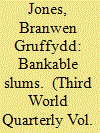| Srl | Item |
| 1 |
ID:
113353


|
|
|
|
|
| Publication |
2012.
|
| Summary/Abstract |
This article develops a critical analysis of the Slum Upgrading Facility, a new initiative of UN-Habitat which seeks to improve conditions for residents of slums in Africa and elsewhere. The analysis highlights the neoliberal principles underpinning this initiative, and especially the vision of slum improvement by means of financialisation. The article argues that it is necessary and important to recognise the politics of international urban development and housing, which has since the 1970s increasingly emphasised neoliberal principles of private property and market institutions. The novel ambition of financialisation must also be situated in relation to historical transformations of housing finance in Anglo-American capitalism over the past three decades. After situating the ideological principles underpinning the Slum Upgrading Facility in these longer and broader global trajectories of international policy, the final section returns to the present to examine other initiatives currently being pursued alongside slum upgrading: the active promotion of mortgage markets in Africa.
|
|
|
|
|
|
|
|
|
|
|
|
|
|
|
|
| 2 |
ID:
119683


|
|
|
|
|
| Publication |
2012.
|
| Summary/Abstract |
There is little doubt that China's international reemergence represents one of the most significant events in modern history. As China's political economy gains in importance, its interactions with other major political economies will shape global values, institutions, and policies, thereby restructuring the international political economy. Drawing on theories and concepts in comparative capitalism, the author envisages China's reemergence as generating Sino-capitalism-a capitalist system that is already global in reach but one that differs from Anglo-American capitalism in important respects. Sino-capitalism relies more on informal business networks than legal codes and transparent rules. It also assigns the Chinese state a leading role in fostering and guiding capitalist accumulation. Sino-capitalism, ultimately, espouses less trust in free markets and more trust in unitary state rule and social norms of reciprocity, stability, and hierarchy.
After conceptualizing Sino-capitalism's domestic political economy, the author uses the case of China's efforts to internationalize its currency, the yuan or renminbi, to systematically illustrate the multifarious manner in which the domestic logic of Sino-capitalism is expressed at the global level. Rather than presenting a deterministic argument concerning the future international role of China, he argues that China's stance and strategy in the international political economy hew quite closely to Sino-capitalism's hybrid compensatory institutional arrangements on the domestic level: state guidance; flexible and entrepreneurial networks; and global integration. Sino-capitalism therefore represents an emerging system of global capitalism centered on China that is producing a dynamic mix of mutual dependence, symbiosis, competition, and friction with the still dominant Anglo-American model of capitalism.
|
|
|
|
|
|
|
|
|
|
|
|
|
|
|
|